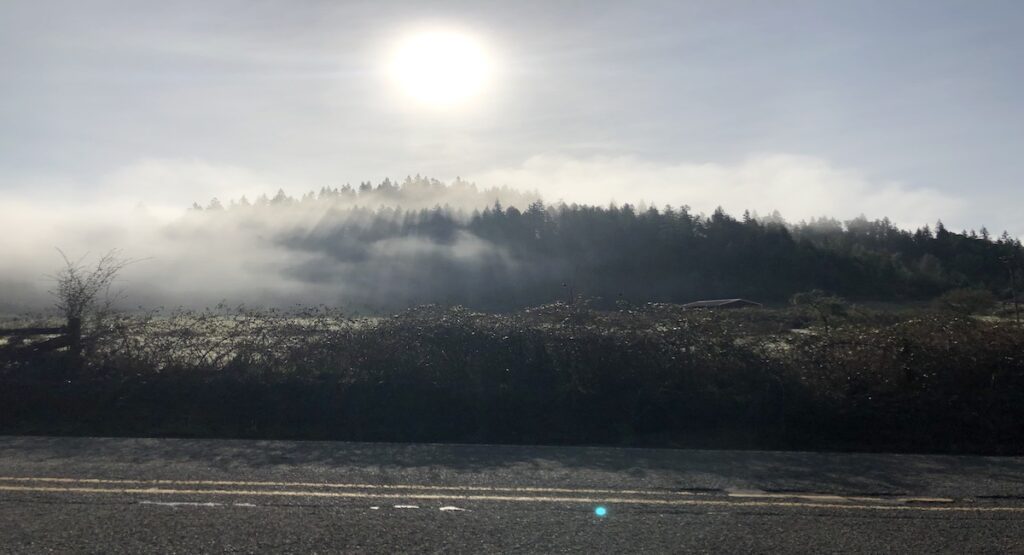
On March 30 and 31, the Oregon Poor People’s Campaign: A National Call for Moral Revival hit the road on its National Emergency Truth and Poverty Tour. The truths we elevated were not just the violence, pervasiveness, and needlessness of poverty, but also the courage and wisdom of the most impacted. In our conversations with other survivors and activists, we found hopelessness and perseverance, doubt and renewed commitment, and impatience for action along with a recognition of the need to build relationships and trust.
About fifteen of us gathered first on Saturday morning at the Right 2 Dream Too camp, a safe place to rest for Portland’s unhoused community, on the east bank of the Willamette River. Our fellow Oregon Coordinating Committee member, Pastor Cecil, inspired us with words connecting our work to the National Day of Commemoration of Cesar Chavez, March 31. Then, our fellow Campaign organizer and former member of the camp, Michael, led us into the camp where he showed us half a dozen tiny houses (renamed “sleeping pods” to avoid the extra injustice of having them taxed). He explained that the City of Portland points to this tiny allocation of land, along with a couple of others, to show how it’s addressing the issue. Recent estimates are that there are 14,000 houseless people in the city. He also mentioned that wealthy residents on the opposite shore had complained about their blighted view across the river from them.
[aesop_image img=”https://kairoscenter.org/wp-content/uploads/2019/04/qbtlh69URMaaECsfGIZoMQ.jpg” panorama=”off” alt=”Right 2 Dream Too Encampment” align=”center” lightbox=”on” caption=”Michael Ryan of the Oregon Poor People’s Campaign gives us a tour of the Right 2 Dream Too encampment in Portland.” captionposition=”left” revealfx=”off” overlay_revealfx=”off”]
We then crossed the river into Old Town/Chinatown to visit Sisters of the Road, the 40 year old cafe for the de-housed and other poor people. We had a good long conversation with its director and another staff member, who spoke of their long history of serving up food and respect, and maintaining a space for dignity and community amidst constant pressure from the neighborhood’s business alliance to drive them out. They brought us up to date on their collaborative campaign for a Homeless Bill of Rights with the Western Regional Advocacy Project, and their advocacy for a compassionate non-police first response system on the streets.
[aesop_image img=”https://kairoscenter.org/wp-content/uploads/2019/04/YDPakRpkT3MMIJRZG5mVw-e1555599721123.jpg” panorama=”off” imgwidth=”300px” alt=”Oregon Poor People’s Campaign” align=”right” lightbox=”on” caption=”One of the Oregon tour vans parked at Camp Myrtlewood near Coos Bay in Southern Oregon.” captionposition=”left” revealfx=”off” overlay_revealfx=”off”]
Next, about a dozen of us rolled onto Interstate 5 and drove 150 miles south to Camp Myrtlewood in Coos County, one of the poorest in the state. There, Director Morgan and the other good folks of that social justice church camp, hosted us and others they had invited from around the county for an overnight stay and a Poor People’s Campaign orientation. We shared two meals, lots of spirited singing, and intense conversation about a proposed and opposed natural gas terminal in Coos Bay and the growing numbers of the unhoused and un-resourced citizens in the county.
We were all touched and bolstered by Lynda, an unhoused woman of the community who shared her story of deprivation and resilience in tears and apparent despair on Saturday night, and then stepped up Sunday morning, drawing on her sense of self-worth and power, to declare her intention to join the Poor People’s Campaign Circle (local group), to be initiated by the folks at Camp Myrtlewood.
We ended our tour 60 miles to the west in Roseburg, a town of 20,000+, where we took a meal of tacos, beans, rice, and brownies to Eagles Park and a gathering of houseless folks. People there told us of an almost complete lack of services and shelter, and nightly police sweeps of the parks where they congregated. Over a couple of hours, we engaged at least three of them who expressed interest in working with the Campaign and with whom we will reconnect.
[aesop_image img=”https://kairoscenter.org/wp-content/uploads/2019/04/9pvQcwuLTAeE67vrrnZrNA.jpg” panorama=”off” alt=”Roseburg, Oregon” align=”center” lightbox=”on” caption=”Gathering at Eagles Park in Roseburg, Oregon for a meal and conversation with the unhoused. ” captionposition=”left” revealfx=”off” overlay_revealfx=”off”]
Through all of this we recognized, perhaps more than at anytime in our brief history of working together, the value of some of the foundational tools of our Campaign — song, communing around meals, and deeply connecting conversation, both humorous and pointedly serious. These allowed us to link the struggles around immediate threats and needs to the four evils — poverty, systemic racism, the war economy, and environmental devastation — to moral revival, and the need for sustained movement-building. While we keep grappling with exhortations, from within and from others, for action, we continue to reach for and center the most impacted, build our capacity for direct action, and change the narrative in each and every dialogue. Moving at the speed of trust, we are not waiting for justice.
Michaela McCormick (she/her) is a member of the Coordinating Committee of the Oregon Poor People’s Campaign. Michaela has been involved in social movements for forty-five years, having worked with and been mentored by legendary activists such as George Lakey and James and Grace Lee Boggs. During that time she also had a career in conflict resolution, public dialogue, training, and university teaching. She is a published writer in the areas of community organizing, mediation and conflict resolution, public dialogue, and creative non-fiction. She also teaches the Buddhist dharma and leads self-reflective workshops on white awareness, anti-racism, patriarchy, and social liberation.
The Oregon Poor People’s Campaign: A National Call for Moral Revival Coordinating Committee currently has eight members, among whom are represented the NAACP, the Buddhist Peace Fellowship, On Earth Peace, the Ecumenical Ministries of Oregon, and several individual churches. The Coordinating Committee is facilitating the emergence of local PPC groups, what Oregon PPC is calling “circles,” in Eugene, Coos County, and Portland. Oregon PPC goals include targeting corporate as well as electoral and legislative power.